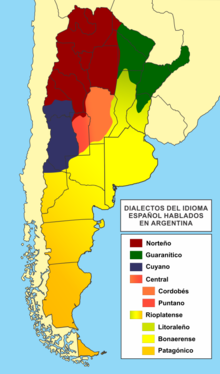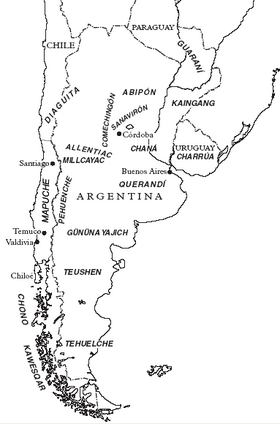Languages of Argentina
There is also Portuñol, a pidgin of Portuguese and Spanish spoken since approximately 1960 in the areas of Argentina that border Brazil.
Multitude of Eurasian and immigrant languages are spoken in their respective ethnic communities throughout the country; these are namely Albanian, Arabic, Armenian, Asturian, Basque, Belarusian, Bosnian, Bulgarian, Catalan, Chinese, Croatian, Czech, Danish, Dutch, Estonian, Finnish, French, Galician, Greek, Hebrew, Hungarian, Irish, Japanese, Korean, Latvian, Lithuanian, Macedonian, Norwegian, Occitan, Polish, Portuguese, Romani, Romanian, Russian, Serbian, Slovene, Swedish, Turkish, Ukrainian, Welsh, and Yiddish.
The Republic of Argentina has not established, legally, an official language; however, Spanish has been utilized since the founding of the Argentine state by the administration of the Republic and is used in education in all public establishments, so much so that in basic and secondary levels there is a mandatory subject of Spanish (a subject called "language").
[a] The most prevalent dialect in Argentina is Rioplatense, whose speakers are located primarily in the basin of the Río de la Plata.
[7] Argentina is one of several Spanish-speaking countries (along with Uruguay, Paraguay, El Salvador, Nicaragua, Honduras, and Costa Rica) that almost universally use what is known as voseo—the use of the pronoun vos instead of tú (the familiar "you") as well as its corresponding verb forms.
There are seven variations present that are marked by their geographical origin, detailed here are South Bolivian Quechua and Santiagueño Quechua: In the provinces of Corrientes, Misiones, Chaco, Formosa, Entre Ríos,[18][19] and Buenos Aires dialects of Argentine Guarani are spoken or known by nearly one million people, including Paraguayan immigrants that speak Paraguayan Guarani or Jopara.
[15] In Corrientes, the Argentine Guarani dialect was decreed co-official in 2004 and made obligatory in educational instruction and the government.
[21] Central Aymara is a language of the Aymaran group, spoken by 4,100 inhabitants of Jujuy, of the North of Salta, besides the immigrants of Puna and of Peru.





